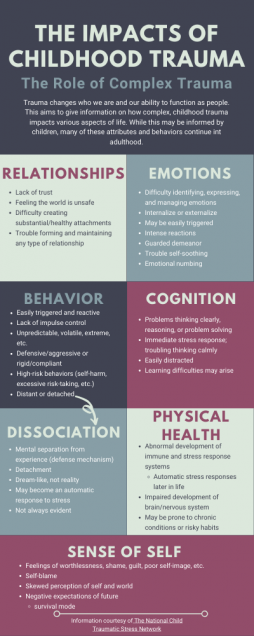Childhood + Complex Trauma
I’m very closed off when it comes to my experience with childhood trauma; only a handful of people know what has happened in my life. For this post, I won’t go into detail about what has happened specifically over the course of my life, but rather how it has impacted me as an adult. I will say, my trauma relates to substance abuse and instability, though not in the way one may assume.
A psychiatrist not too long ago told me I seemed detached from my past, and he’s not wrong. As I’ve gotten older, I have taken inventory of all the emotional, social, and mental changes my childhood has caused. In essence, I don’t know how to cope or communicate my emotions effectively; I’ve adap ted in perhaps not the best of ways.
ted in perhaps not the best of ways.
These drawbacks, however, have given me inspiration. I know it’s not just me that has gone through trauma that has shaped the personality, and that has encouraged me to educate a more neurotypical community and advocate for those like me.
According to The National Child Traumatic Stress Network, complex trauma, “describes both children’s exposure to multiple traumatic events—often of an invasive, interpersonal nature—and the wide-ranging, long-term effects of this exposure. These events are severe and pervasive.” In general, it may seem obvious that persistent trauma would impact children in several ways, but it is incredible just how many areas trauma can reach into. I have outlined these in the infographic to the left.
But what happens when these children grow up? We turn into adults with a history, one that may constantly worm its way into our present. The areas impacted by trauma that I mentioned don’t just affect the child in the face of trauma, but the adult they become in the wake of it.
Harvard psychiatry professor, Dr. Kerry Ressler, says “Early childhood trauma is a risk factor for almost everything, from adult depression to PTSD and most psychiatric disorders, as well as a host of medical problems, including cardiovascular problems such as heart attack and stroke, cancer, and obesity.”
From my own experience, all of this makes sense. When you are faced with a trauma, you jump into survival mode even if you aren’t in any true danger. When this is a persistent feature in one’s life, it seems fair to assume this may carry on across the life span. To me, treatment needs to focus on healing the traumatized child still within us. Only then can we proceed with learning to function as an adult.
One comment
Thanks for sharing what you did share. I think this post is really important, because it’s easy for us – when focusing on one component or another of trauma – to forget that these things influence a whole life course, not just the part of life in which something happens.
The graphic you made is also very effective. It gets many crucial details across in a way that is easy to understand, and also very aesthetically pleasing. (I really liked the detail of the colors of each square influencing the text colors of the others.) Great job!
Comments are closed.